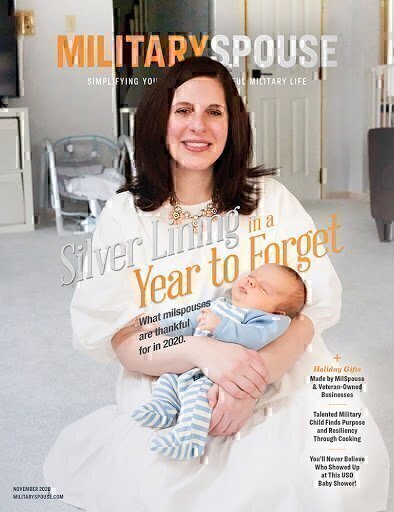See this and more in the November issue of Military Spouse Magazine!
Deployments are never easy, but the 2020 pandemic has added a new layer of challenges for everyone involved in a deployment this year. We checked in with military spouses to see how COVID has affected their service member’s deployment. From mild inconveniences to serious setbacks, these spouses tell all, with the hope that their stories will help commands make more informed decisions in the future that will benefit deployed troops and their families.
Social distancing is not working
The DoD response to COVID was slow and inconsistent. Safety precautions and mandates were left up to individual commands. This means some areas and units did an excellent job of enforcing distancing procedures and wearing masks, while other units continued to meet in formations, hold classes, and conduct training as usual. This frustrated service members and families members alike. An Air Force wife reported, “My husband came in direct contact with an Army person who had COVID, and my husband was not tested or put in quarantine because he is not in the same command.”
In deployment settings, it is often impossible to enforce social distancing. Some spouses report that their service member feels health risks are not being taken seriously or enforced consistently. Nicole said, “Social distancing in the chow hall doesn’t do much for all the times they are close together and breathing on each other during missions and on buses. They weren’t provided masks or given many directions.”
Troops view quarantine as “a type of prison”
Deployment conditions already challenge troop morale, and COVID restrictions aren’t helping. Ships are canceling port calls, troops are denied R&R leave during yearlong deployments, and homecoming dates are being changed even more than usual. One active duty sailor and milspouse told us her view of deployment changed drastically when her ship canceled port calls. “I had viewed deployment as basically a fun adventure, and now it looks like it will be the same tasks every day without a break in sight.”
Spending several weeks in quarantine prior to deployment is impacting troop morale. With no designated quarantine facilities, troops are experiencing the worst parts of military life without the ability to do their job. One soldier in quarantine said, “This must be what prison is like.” Service members are expected to stay in their rooms, without access to good food, fitness equipment, or cleaning supplies. One airman referred to his quarantine rations as “slop,” while another service member said the food from the chow tent isn’t nearly as good as the food from the regular chow hall. Stephanie, whose husband is currently in quarantine with his entire unit, said, “They are bored out of their minds. It’s been almost two weeks, but he said it feels like it’s already been five months.”
Training delays have a domino effect
In spring, the stop-movement order meant many units delayed essential training or deployment departures. This left some troops deployed overseas without a relief unit in place. For months, families were teased with the chance that deployment dates would remain the same, only to have their hopes dashed as homecoming dates were delayed by several months.
Spring delays resulted in summer and fall deployment date changes. Some families are spending more time than usual in the stressful pre-deployment stage, while others are rushing into deployments with little preparation time. Baylee, a Navy spouse, said, “Deployment got pushed up four months with a two-week notice.” Another spouse explains, “Our deployment date was extended due to COVID, another hit to everyone’s energy and motivation. The incoming unit was delayed in their training due to COVID, which pushed back my husband’s RIP (Relief in Place) date.”
Troops worry about their families
Deployed troops are either unaware of the current COVID restrictions in the states, or overly worried for their family members back home. A pregnant Navy spouse reported her sailor is very concerned for her safety during the pregnancy. An Army spouse told us, “I feel as though they don’t have a full grip on how affected we are by it here in the states and how prevalent it is in our whole existence now.” On the other hand, military girlfriend Priscilla tells us her service member in the Middle East worried for her safety every day. “He was sad he wasn’t here to support. He has an elderly father that I take care of, so the worry affected his moods and concentration. He apologized a lot and disconnected himself because he blamed himself for not being here.”
Service members and families experiencing deployments this year need extra support, so reach out and check on your friends going through deployment—they need all the morale boosts they can get!









